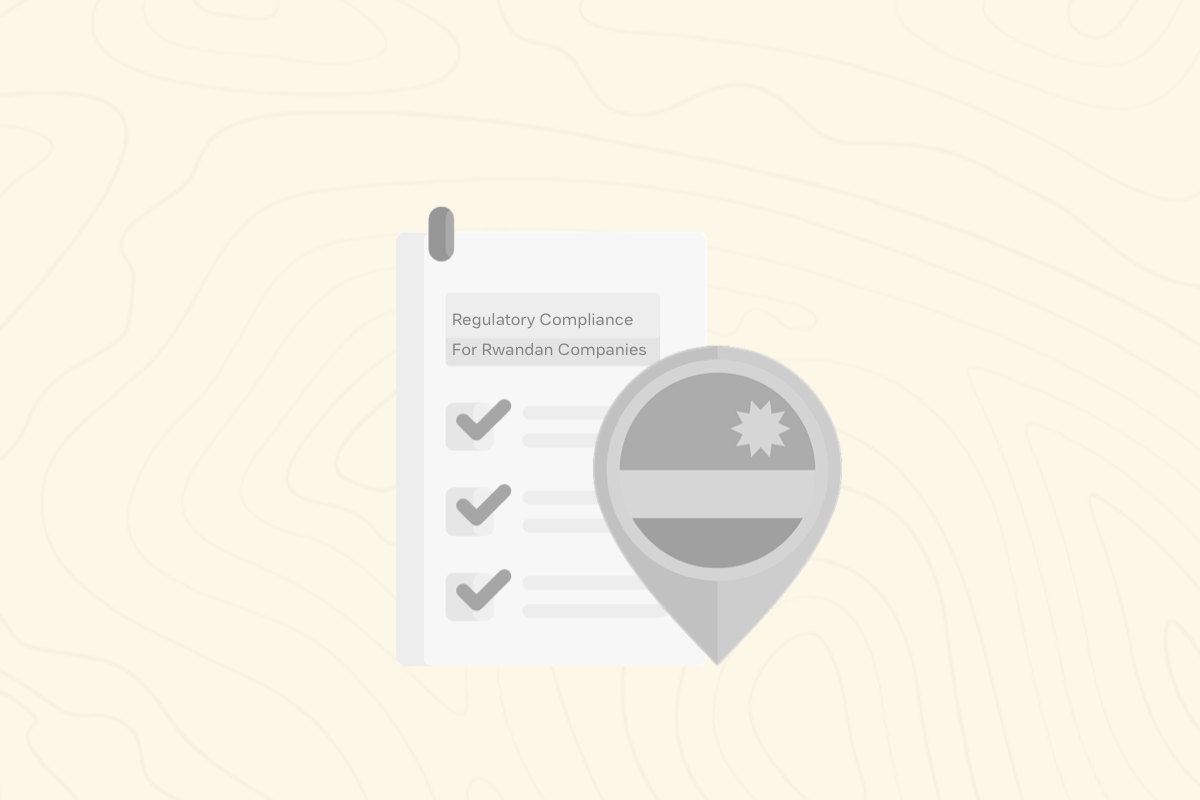Adherence to regulatory compliance is essential for Rwandan businesses to thrive in the fast-paced business environment of today. It can be overwhelming to navigate the complex web of rules, regulations, and requirements, but do not worry! We now give you access to a thorough and essential regulatory compliance checklist created especially for companies in Rwanda.
Regulatory compliance checklist for Rwandan companies
1. Annual returns and Audited Financial Statements
The financial statement, the income statement, the balance sheet, and the cash flow statement are the four primary financial regulatory compliance documents for Rwandan companies. The calendar year in Rwanda is the standard tax year but a company can request a different 12-month period.
Directors are to make sure their company submits its annual return along with a copy of the auditor’s report in the prescribed form to the Registrar General every year during the month designated to the company, signed by the director(s) attesting that the information on the register is accurate.
Simplify your compliance journey with Norebase-tailored tax services. From tax planning and preparation to filing and documentation, our dedicated professionals have got you covered. Discover how our expertise can help you minimise risks and maximise efficiency. Get in touch today!
2. Annual Corporate Income tax returns
The corporate income tax return should be filed three months after the tax period. The tax is due for payment three months after the tax period in three instalments. After the end of the sixth, ninth, and twelfth month of the tax period, (for example, payments are due on 30 June, 30 September, and 31 December if the company uses the calendar year).
The income tax for companies is 30% and this is levied on profits. For the first year of registration, the tax is declared and paid no later than March 31 of the following year. Thereafter, it is declared and paid on a quarterly basis prior to the deadlines of June 30, September 30, December 31, and March 31.
For late payments, the interest rate is set at 1.5% and is calculated on a monthly basis starting on the day after the tax is due and ending on the day of payment.
3. Value Added Tax (VAT)
In Rwanda, the rate of VAT is typically 18% taxation paid on goods and services with some services and products exempted. It must be paid by every individual who uses taxable imports or locally-made products. Within 15 days of the month or quarter in which the tax was collected, the tax must be declared and paid.
4. Pay as You Earn (PAYE)
Tax on employment income is called PAYE. According to the Tax Code, when an employer provides an employee with employment income, the employer is required to deduct, report, and pay PAYE tax to the Rwanda Revenue Authority within 15 days of the end of the month for which the tax was due. The basic income is increased by allowances paid (in cash), which are also taxed.
When a casual worker is hired for fewer than 30 days in a given tax year, the employer is required to withhold 15% of the casual worker’s taxable employment income. The first 60,000 RWF of income earned is taxed at a flat rate of 0%. If a taxpayer doesn’t pay their taxes by the deadline, they are required to pay interest on the whole amount due as a penalty.
5. Rwanda Social Security Board (RSSB) contributions
All employers are required to register for the Pension Scheme, Occupational Hazards, and Maternity Leave. After registration of business, a company must register with RSSB within seven business days.
The pension scheme is intended to assist old and invalid employees who are unable to work, it also helps the family members of a deceased worker.
The overall rate for the pension plan is 8%. This consists of 5% paid by the employer, which includes contributions to the Occupational Hazards Scheme, and 3% deducted from the employee’s income. Except for transportation allowances and in-kind transportation benefits, all employment income is subject to this tax.
The rate for the maternity leave program is 0.6% overall. This consists of 0.3% paid by the employer and 0.3% withheld from the employee. The overall rate for the medical scheme is 15%. It is paid by both the employer and the employee at the rate of 7.5% each. The contribution is deducted on a monthly basis and paid not later than the 10th day of the following month, and there is a penalty of 1.5% for late payment.
6. Data Protection
The Law on the Protection of Personal Data and Privacy (Data Privacy Law), which took effect on October 15, 2021, is Rwanda’s national data protection law. According to this regulation, companies must keep track of user personal data, appoint a dedicated data protection officer to conduct Data Protection Impact Assessments (DPIAs), and set up a breach notification system. There is a transition period before enforcement, and businesses and individuals in Rwanda who handle the personal data of residents have until October 2023 to prepare and comply.
The National Cyber Security Authority (NCSA) is the legal supervisory authority in charge of this new law.
Conclusion
By carefully following the regulatory compliance checklist for Rwandan businesses, your company gains a competitive edge and promotes stakeholder trust.
Stay ahead of the curve by choosing Norebase as your dependable compliance partner. Gain access to up-to-date information, knowledgeable analysis, and compliance solutions that are specifically suited to your industry. We have built a software, Autocomply, that keep you informed on all you legal compliance to avoid missing deadlines, and can also help you complete your compliance tasks, Join the waitlist here.
Join our network of delighted clients today, sign up here. Learn more about compliance for startups,



